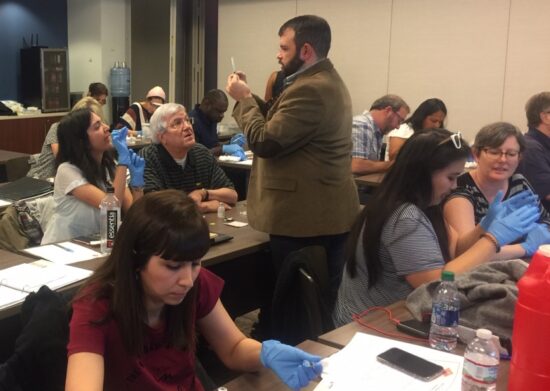Monkeypox gets scarier, when diabetics should exercise, new opioid guidelines, and more
05 Nov 2022
Posted by Andrew Kantor
Later exercise means less insulin resistance
People with type 2 diabetes might benefit more by exercising in the evening (or at least the afternoon). That’s what Dutch epidemiologists found by studying liver fat content and insulin resistance.
The findings suggest that moderate-to-vigorous physical activity in the afternoon led to an 18% reduction in insulin resistance, and the same types of activity in the evening were linked to a 25% reduction — in comparison to physical activity spread throughout the day.
They don’t think this study should change people’s habits if they’re exercising during the day, because all exercise is good exercise. But it’s worth doing more research.
CDC swings the opioid pendulum back
In 2016, the CDC issued new opioid-prescribing guidelines to help stem the abuse epidemic. But a lot of folks said it went too far, and people who actually needed regular painkillers weren’t able to get them.
So now it’s updated its opioid guidelines to “[include] recommendations for managing acute (duration of <1 month), subacute (duration of 1–3 months), and chronic (duration of >3 months) pain.”
The new guidelines include 11 recommendations in four categories:
- Determining Whether or Not to Initiate Opioids for Pain
- Selecting Opioids and Determining Opioid Dosages
- Deciding Duration of Initial Opioid Prescription and Conducting Follow-Up
- Assessing Risk and Addressing Potential Harms of Opioid Use
It’s a government report, so it’s huge — the recommendations section alone is more than 33,000 words.
But wait! You can skip all that and just click here to scroll down to the summary that’s contained in boxes 3 and 4. You’re welcome.
Last chance for the world’s best update on immunization skills*
GPhA is offering the nation’s hottest immunization course just once more in 2022!
APhA’s Pharmacy-Based Immunization Delivery: A Certificate Program for Pharmacists is coming to Georgia, bringing a whopping 20 hours of CE (!) and giving you the latest immunization skills that you can add to your CV (or wave the certificate) to impress your patients (and your boss).

It’s popular for a reason! Pharmacists finish with comprehensive knowledge, skills, and resources to provide their patients with the best immunization services, period — today and across their lifespan.
The 20 hours of CE includes the live seminar, hands-on training, and online self-study. The seminar and training: Sunday, December 11, 2022 from 8:00 am – 5:00 pm at GPhA’s Sandy Springs Classroom, Sandy Springs (map).
Click here for the details and sign up before the class fills again!
* Prove us wrong.
Georgia Tech cures type 1 diabetes
Well, potentially. In theory. But in case it really does work, the researchers there have created a company (iTolerance) to sell it.
What they’ve done is create a biomaterial they call iTOL-100 that they say can carry a transplant of insulin-producing cells into a patient whose body can’t produce them.
The trick breakthrough is that those cells are “decorated with a potent immunomodulatory protein.” The idea is that patients won’t need to take immunosuppressants to accept the cells because that decoration “trains the immune system to accept the graft as self.”
Despite the excited headline, iTOL-100 is still in the early stages, but the potential, the researchers say, is huge. Sure, at the moment they’re working with insulin-producing stem cells, but there’s no reason the same rejection-proof platform can’t deliver other therapies to other organs.
“The material is really agnostic to what the cell source is. It’s just a matter of combining the cells with the body materials and transplanting.”
Okay, now you can start to worry about monkeypox
Two stories, same idea: Monkeypox is evolving, and the new strains are more dangerous.
Obviously the virus will have evolved over the decades since it first started spreading (in 1965), but what University of Missouri researchers found is that the mutations are in places we really don’t want them to be.
“By doing a temporal analysis, we were able to see how the virus has evolved over time, and a key finding was the virus is now accumulating mutations specifically where drugs and antibodies from vaccines are supposed to bind. So, the virus is getting smarter, it is able to avoid being targeted by drugs or antibodies from our body’s immune response and continue to spread to more people.”
Meanwhile, CDC researchers were looking at the newest outbreak in the “Democratic” Republic of the Congo. They found that the strain that’s spreading there (called Clade I) is more than three times as deadly than the one spreading around the world (Clade II). Worse, it’s also much more transmissible.
More to come, for sure.
The Long Read: OTC Hearing Aids edition
An otolaryngologist and an audiologist explain everything you need to know about over-the-counter hearing aids — the types, why “self-fitting” devices are better (if used correctly), and how to choose one.


